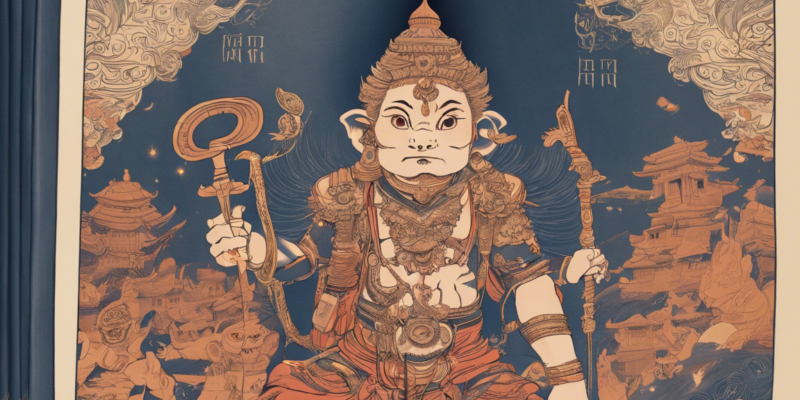In the vast realm of Hindu mythology, the Asura Book stands out as a significant and captivating piece of ancient literature. This mystical text delves into the enigmatic world of the Asuras, a group of powerful, often malevolent beings in Hindu mythology. The Asura Book is a treasure trove of tales, teachings, and insights that offer a glimpse into the complex nature of these celestial beings and their interactions with gods, humans, and the universe at large.
Unraveling the Origins of the Asura Book
The Asura Book is believed to have originated in ancient India, where stories and legends of the Asuras were passed down through generations. These tales were eventually compiled into a comprehensive text that offered a comprehensive overview of the Asuras, their powers, their conflicts with the Devas (celestial beings), and their roles in the cosmic order.
Themes and Motifs in the Asura Book
The Asura Book explores a wide range of themes and motifs that are central to Hindu mythology and philosophy. Some of the key themes include:
1. Power and Conflict:
- The Asuras are known for their immense power and often engage in epic battles with the Devas. These conflicts serve as allegories for the eternal struggle between good and evil, order and chaos.
2. Wisdom and Knowledge:
- Despite their sometimes malevolent nature, the Asuras are also depicted as beings of great wisdom and knowledge. The Asura Book delves into their intellectual pursuits and their quest for enlightenment.
3. Dualities and Paradoxes:
- The Asuras embody dualities and paradoxes, blurring the lines between good and evil, light and darkness. The Asura Book explores these complexities and challenges traditional notions of morality and righteousness.
Key Figures in the Asura Book
The Asura Book features a cast of fascinating characters, each with their own unique traits and stories. Some of the key figures include:
1. Ravana:
- Perhaps the most famous Asura in Hindu mythology, Ravana is the primary antagonist in the epic Ramayana. Known for his ten heads and mastery of dark magic, Ravana is a complex and multi-faceted character whose story is intertwined with themes of power, love, and redemption.
2. Mahabali:
- Another prominent Asura, Mahabali is celebrated in the festival of Onam in Kerala. He is renowned for his generosity and benevolence, challenging traditional notions of Asuras as malevolent beings.
3. Hiranyakashipu:
- A powerful Asura king who sought immortality through a boon from Lord Brahma, Hiranyakashipu is a symbol of arrogance and hubris. His story is a cautionary tale about the consequences of unchecked ambition.
Lessons and Teachings from the Asura Book
Beyond its captivating stories and characters, the Asura Book offers valuable lessons and teachings that are still relevant today. Some of the key teachings include:
1. Self-Reflection:
- The Asura Book encourages readers to reflect on their own dualities and contradictions, acknowledging that true wisdom comes from embracing one’s complexities.
2. Power and Responsibility:
- The text explores the relationship between power and responsibility, highlighting the consequences of using power for selfish gains versus the greater good of all beings.
3. Unity in Diversity:
- Through the interactions between the Asuras and Devas, the Asura Book emphasizes the importance of embracing diversity and finding common ground amidst differences.
Frequently Asked Questions (FAQs) about the Asura Book
1. What is the significance of the Asuras in Hindu mythology?
- The Asuras represent the darker aspects of existence and serve as foils to the Devas, highlighting the eternal struggle between good and evil.
2. Is the Asura Book a religious text or a work of fiction?
- The Asura Book is a blend of mythology, religion, and philosophy, offering spiritual insights through narrative storytelling.
3. Are there different versions of the Asura Book?
- Like many ancient texts, the Asura Book has been passed down through oral traditions, leading to variations in different retellings.
4. What lessons can readers learn from the Asura Book?
- Readers can learn about the complexities of human nature, the consequences of unchecked power, and the importance of balance and harmony in the universe.
5. How does the Asura Book influence contemporary culture and literature?
- The themes and motifs in the Asura Book continue to inspire modern storytellers, artists, and philosophers, reflecting timeless truths about the human experience.
As one delves deeper into the Asura Book, the mysteries and complexities of this ancient text begin to unfold, offering profound insights into the nature of existence, power, and the eternal struggle between light and darkness. Through its captivating stories, rich symbolism, and timeless teachings, the Asura Book continues to captivate and inspire readers of all ages, inviting us to explore the depths of our own inner Asuras and Devas.


Comments